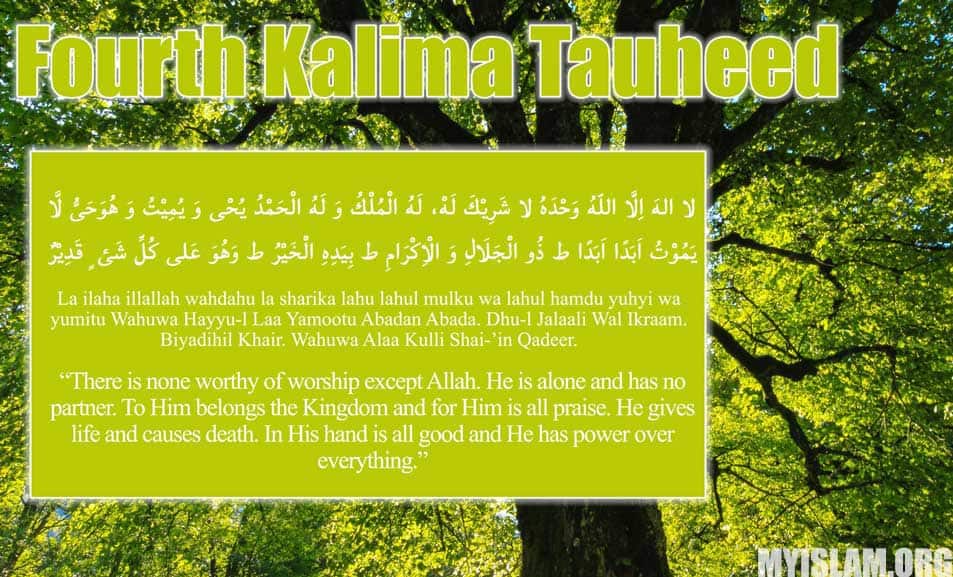The fourth kalima is also referred to as Tauheed or Tawheed meaning ‘unification of oneness of God’. This is the first pillar which is the central doctrine in Islam. It holds that Allah is One (Al-Ahad) and Single (Al-Wahid).
In the Qur’an one of the worse sins you can commit is shirk, which refers to associating partners or to accept other divinities alongside Allah. Shirk is a serious sin and according to Qur’an is unforgivable.
In the Quran, Surah Ikhlas describes the Oneness of Allah and is a good introduction to learning about Tauheed:
- Say, “He is Allah, [who is] One,
- Allah, the Eternal Refuge.
- He neither begets nor is born,
- Nor is there to Him any equivalent.”
Now that we have covered the importance of the fourth Kalima, let’s move onto actually learning what it is.
Fourth Kalma Touheed in Arabic:
In Arabic, the fourth kalima is read:
لَآ اِلٰهَ اِلَّا اللهُ وَحْدَهٗ لَا شَرِيْكَ لَهٗ لَهُ الْمُلْكُ وَ لَهُ الْحَمْدُ يُحْىٖ وَ يُمِيْتُ وَ هُوَحَیٌّ لَّا يَمُوْتُ اَبَدًا اَبَدًاؕ ذُو الْجَلَالِ وَالْاِكْرَامِؕ بِيَدِهِ الْخَيْرُؕ وَهُوَ عَلٰى كُلِّ شیْ ٍٔ قَدِیْرٌؕ
Transliteration
la ilaha illallah wahdahu la sharika lahu, lahul mulku wa lahul hamdu yuhyi wa yumitu Wahuwa Hayyu-l Laa Yamootu Abadan Abada. Dhul Jalaali Wal Ikraam. Biyadihil Khair. Wahuwa Ala Kulli Shai-in Qadeer.
The English Translation of Kalima Shahadat
The meaning of this supplication is,
(There is) none worthy of worship except Allah. He is only One. (There is) no partners for Him. For Him (is) the Kingdom. And for Him (is) the Praise. He gives life and causes death. And He (is) Alive. He will not die, never, ever. Possessor of Majesty and Reverence. In His hand (is) the goodness. And He (is) the goodness. And He (is) on everything powerful.
Benefit Based on Hadith:
First, the six kalimas are not found anywhere altogether either in Quran or Hadith. They are authentic forms of dhikr (prayers) which can be offered and their purpose seems to be educational, especially for children or new Muslims as they are a good foundation to learning about Islam.
There are many different hadiths which mentions parts of the fourth kalima and their significance.
In the Sahih hadith 1340 of Sunan an-Nasai (Darussalam), It was narrated that Abu Az-Zubair said: “Abdullah bin Az-Zubair used to recite the tahlil following every prayer, saying:
La Ilaha Illallah wahdahu la sharika lah, lahul-mulk wa lahul-hamd wa huwa ‘ala kulli shay’in qadir, la hawla wala quwwata illa billahil-‘azim; la ilaha ill-Allahu wa la nabbed illa iyyah, ahlan-ni’mati wal-fadli wath-thana’il-has an; la ilaha ill-Allah, mukhlisina lahud-dina wa law karihal-kafirun (There is none worthy of worship except Allah (SWT) alone, with no partner or associate. His is the Dominion, to Him be all praise, and He is able to do all things; there is no power and no strength except with Allah (SWT) the Almighty. There is none worthy of worship except Allah (SWT), and we worship none but Him, the source of blessing and kindness and the One Who is deserving of all good praise. There is none worthy of worship except Allah (SWT), and we are sincere in faith and devotion to Him even though the disbelievers detest it. ) Then Ibn Az-Zubair said: ‘The Messenger of Allah (ﷺ) used to recite the tahlil in this manner following every prayer.'”
Although not eactly the same dhikr, we can see the similarity. The importance is that the Prophet (ﷺ) used to make an effort after every prayer to remember Allah by reciting tahlil (saying la ilaha illa llah = there is no deity but Allah) and the fourth kalima accomplishes that.
In Sahih Muslim 2691, Abu Huraira reported Allah’s Messenger (ﷺ) as saying: He who uttered these words:”
There is no god but Allah, the One, having no partner with Him. Sovereignty belongs to Him and all the praise is due to Him, and He is Potent over everything” one hundred times every day there is a reward of emancipating ten slaves for him, and there are recorded hundred virtues to his credit, and hundred vices are blotted out from his scroll, and that is a safeguard for him against the Satan on that day till evening and no one brings anything more excellent than this, except one who has done more than this (who utters these words more than one hundred times and does more good acts) and he who utters:” Hallowed be Allah, and all praise is due to Him,” one hundred times a day, his sins are obliterated even if they are equal to the extent of the foam of the ocean.
According to this hadith, those who recite La ilaha illallahu, wahdahu la sharika lahu, lahul-mulku wa lahul-hamdu, wa Huwa ala kulli sha’in Qadir 100 times in a day would be rewarded as if they freed 10 slaves, would receive 100 credit and 100 sins will be forgiven.
In the Quran there’s an ayah (5:6) which says “Allah does not intend to make difficulty for you”, just the simple recitation of this phrase one hundred times and you will be the receiver of an extensive reward.
Subhanllah, this is the rahma (mercy) of Allah.

